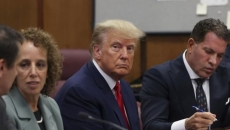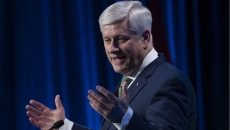The dozens of Kentucky bourbons listed on the BC Liquor Stores website range from a two-ounce bottle of Maker's Mark, priced at $5.29, to a $2,400 bottle of Woodford Reserve, aged in cognac barrels and presented in a crystal decanter.
What they all have in common is the "currently unavailable" designation, having been yanked from sale by British Columbia's government in retaliation for U.S. President Donald Trump's tariffs on Canadian imports.
Calling time on U.S. alcohol has been a popular move among Canadian provincial and territorial governments looking for ways to fight back in the trade war.
It's a way of capitalizing on government control over the alcohol sector, says Samuel Roscoe, a lecturer at the University of British Columbia's Sauder School of Business.
He said B.C. and other provinces are using their jurisdiction over alcohol sales to damage the pocketbooks of American companies and send a message that the U.S. tariffs are unjustified and harmful on both sides of the border.
"In my opinion, it's quite an effective way to get the attention of U.S. companies and for them to realize that tariffs lead to trade wars, and we are now two days into a very significant trade war between (what) used to be two trading partners," he said on Wednesday.
Governments don't have the authority or ability to implement such a prohibition for many other types of goods purchased by private businesses, Roscoe said.
"It's very difficult for the government to step in there, and that's why they have the targeted tariffs," he said of the U.S. alcohol ban, as well as Ottawa's adoption of 25 per cent counter tariffs on $30 billion in goods imported from the United States.
Provinces including Ontario, Quebec and Alberta, among others, have directed their liquor regulators to stop buying all American alcohol, while B.C. has banned liquor from "red states" that voted for Trump last fall.
The B.C. government's tariff response website says the actions will result in an estimated $40 million annual loss for manufacturers "in the states governed by elected officials most supportive of Trump's unfair tariffs."
The moves have the attention of Kentucky Governor Andy Beshear, a Democrat in an otherwise deeply red state who has spoken out against Trump's tariffs, saying the trade war would cause "significant harm" to people and businesses, including those involved in the bourbon industry.
"These tariffs, which are the result of one individual, are going to cause our prices of gas to go up, are going to cause our prices of groceries to go up, are going to raise the cost of housing all across the United States," Beshear said during an appearance on CTV News Channel's Power Play this week.
Last month, Beshear wrote to members of the Kentucky congressional delegation in Washington expressing "serious concerns" about the impacts of retaliatory measures by Canada on the state's bourbon industry.
The bourbon industry accounts for more than $9 billion in economic output each year and supports more than 23,000 jobs in the state, he wrote.
The CEO of Brown-Forman Corp., the maker of Jack Daniels, said the decision by Canadian provinces to take U.S. whiskeys off shelves is "worse than a tariff because it’s literally taking your sales away."
Lawson Whiting said the action is "a very disproportionate response to a 25 per cent tariff."
Canada accounted for only 1 per cent of Brown-Forman's total sales, he noted.
Speaking to reporters on Wednesday, B.C. Premier David Eby said he had seen concerns from Kentucky about the "boycott" of American alcohol.
"Their concern is of course the Canadian boycott but also the prospect of a Mexican boycott as well as the prospect of a European Union boycott," he said.
In a statement to the legislature the same day, Eby said pulling Florida rum, Texas vodka, Tennessee whiskey and Kentucky bourbon from B.C. shelves would "show the president's allies about the integrated nature of our relationship."
Not everyone is convinced banning American alcohol is the best strategy, including Michael Devereux, a professor at the University of B.C.'s Vancouver School of Economics.
"It seems to me that it would be better to just counter like with like, that is put a 25 per cent tariff on whatever goods you decided … you want to target," he said, adding such a move would raise revenue for the B.C. government.
"Just putting a blanket ban on sales actually doesn't do anything except make the sellers in the red states very, very upset," Devereux said.
Roscoe said the outright prohibition on American alcohol by other provinces and territories would likely have a stronger retaliatory impact than B.C.'s "red state" ban.
But Canadians themselves are responding to the tariffs and Trump's talk of making Canada the 51st state by avoiding U.S. products in general, he said.
"So even if they don't go ahead, if the B.C. government doesn't have a blanket ban, I think the American alcohol firms are going to get damaged anyway just because of the buy-Canadian movement, which seems to really be gaining steam."
Asked if B.C. should worry about damaging relationships with neighbouring "blue" Democratic states in the event of an outright ban on American alcohol, Roscoe said the damage had already been done by Trump.
"I don't really think Canadians are considering the relationships with, you know, the more sort of left-leaning states of California and Washington and Oregon.
"I think we're upset at the Trump administration in general," he said.






